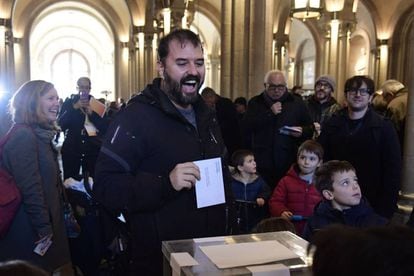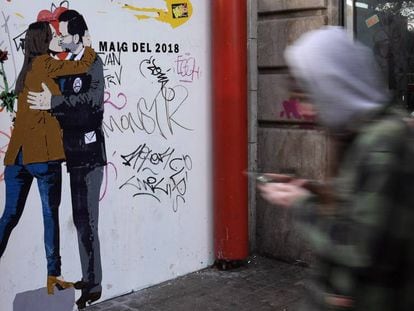Catalan election: separatists win most seats, Ciudadanos the most-voted party
Record turnout of 81% at a vote whose outcome underscores the divisions in Catalan society

With over 99% of the vote counted, Catalonia’s three secessionist parties had secured a combined 70 seats in the regional parliament, two more than the 68 required for a majority in the 135-seat assembly.

But the unionist Ciudadanos was by far the most voted party, attracting over 1.1 million votes (25.37%) compared to 940,000 (21.65%) for its nearest rival, the separatist Junts per Catalunya.
Under the Catalan electoral system, this gives Ciudadanos 37 seats while the party of ousted premier Carles Puigdemont gets 34. The Catalan Republican Left (ERC) comes in third with 32 seats, the Catalan Socialists fourth with 17, Catalunya en Comú-Podem gets eight, while the far-left CUP drops to four and the conservative Popular Party (PP) plummets to three deputies.
The turnout rate on Thursday was a historic high of 81%, higher even than at the landmark Spanish elections of 1982 which brought the Socialist Party of Felipe González to power.
While the development of the situation is not certain, it is expected that the separatist parties (Junts per Catalunya, ERC and CUP) will join forces in a governing coalition. The anti-independence parties (Ciudadanos, Popular Party and Socialists) together do not make up the required 68 seats.
It is unlikely that the outcome will heal the wounds of a deeply divided society. Xavier Domènech, leader of Catalunya en Comú Podem, a party that sides with neither separatists nor unionists, said on Thursday night that “these results reaffirm the need to overcome this polarization and open up a new period.”
The regional vote was called by Spanish Prime Minister Mariano Rajoy using emergency powers under Article 155 of the Spanish Constitution – a move that came in response to the passing of a unilateral declaration of independence in the regional parliament on October 27.

Polling stations closed at 8pm on a day when many people voted in the evening, after work. The fact that the election was held on a workday rather than a Sunday as usual made it more difficult for certain groups, such as the self-employed and shopkeepers, to go vote.
Voting took place throughout the day without incident. People waited for up to 40 minutes to cast their ballot.












































